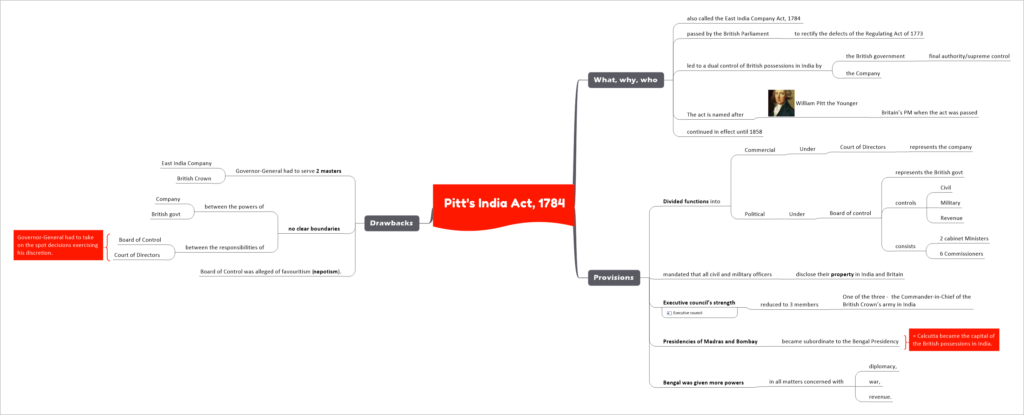Pitt’s India Act, 1784: Background, Provisions, Drawbacks
Indian Polity Mindmap Notes for UPSC » Historical Background » Pitt’s India Act, 1784
Pitts India Act also known as the East Indian Company Act of 1784 was passed by the British Parliament in order to rectify the defects of the Regulating Act of 1773. The company’s affairs and administration were brought under the direct authority of the British government. The act is named after William Pitt the younger (Britain’s PM when the Act was passed). Pitts India Act was continued in effect till 1858.

Provisions of Pitts India Act, 1784
- The Act divided the functions of the company into Commercial and Political.
- Commercial functions were placed under the control of the ‘Court of Directors’ who represents the company.
- Political functions were placed under the control of the ‘Board of Control’ which represents the British government. The board was given full control over the civil, military, and revenue of the company. It consisted of two cabinet ministers and six commissioners. The Secretary of the State was made the president of the Board,
- It mandated that all civil and military officers disclose their property in India and Britain.
- The executive council (established by Regulating Act 1773) was reduced to 3 members. One of the three has to be the Commander-in-Chief of the British Crown’s army in India. Governor-general was given the discretionary power in terms of voting. This provision made it easier to get a majority on any decisions.
- Subordinated the presidencies of Madras and Bombay to the Bengal Presidency. Therefore, Calcutta became the capital of British possessions in India.
- Bengal was given more powers in all matters concerned with diplomacy, war, and revenue.
Drawbacks of Pitts India Act, 1784
- There were no clear boundaries set between the company’s powers and the British government’s authority.
- Now governor-general had to serve two masters, ie., the East India Company and the British crown.
- No clarity on the boundaries between the responsibilities of the Board of Control and the Court of Directors. Governor-General had to take on-the-spot decisions exercising his discretion.
- The Board of Control was alleged of favouritism (nepotism).

